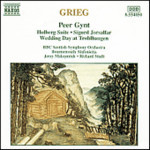
Grieg: Orchestral Music Vol 1 (Incls 'Peer Gynt Suites No. 1 & No. 2)
 $25.00
Out of Stock
$25.00
Out of Stock6+ weeks add to cart
EDVARD GRIEG
Grieg: Orchestral Music Vol 1 (Incls 'Peer Gynt Suites No. 1 & No. 2)
BBC Scottish Symphony Orchestra / Bournemouth Sinfonietta / Jerzy Maksymiuk, Richard Studt
[ Naxos / CD ]
Release Date: Sunday 27 April 2008
This item is currently out of stock. It may take 6 or more weeks to obtain from when you place your order as this is a specialist product.
Edvard Grieg, the greatest of Norwegian composers, was descended on his mother's side from a Norwegian provincial governor who had adopted the name of Hagerup from his adoptive father, the Bishop of Trondheim.
On his father's side he was of Scottish ancestry. His great-grandfather, Alexander Greig, had left Scotland after the battle of Culloden, when the cause of the Stuart claimants to the thrones of England and Scotland was finally destroyed by the English army under its royal Hanoverian general. In Norway the Greigs became Griegs and during the nineteenth century established themselves comfortably in their new country, his father and grandfather both having served as British consul in Bergen.
The Grieg household provided a musical background for a child. Musicians visited the family and these visitors included the distinguished violinist Ole Bull, who persuaded the Griegs to send their son Edvard to Leipzig Conservatory, an institution he entered at the age of fifteen, there to benefit from the demands of a traditional German musical education.
In Leipzig not everything was to Grieg's liking. He objected to the dryness of normal piano instruction, based on the work of Czerny and Clementi, and was able to change to a teacher who was to instill in him a love of Schumann. He attended concerts by the famous Gewandhaus Orchestra that Mendelssohn had once directed and was present when Clara Schumann played her husband's piano concerto there and at performances of Wagner's Tannhäuser. At the same time he was able to meet other musicians, including Arthur Sullivan, whose later fame, at least, was to depend on the music he wrote for the operettas of W.S. Gilbert in London.
After a short period at home again in Norway, where he was unable to obtain a state pension, Grieg moved to Denmark. The capital, Copenhagen, was a cultural centre for both countries, and here he had considerable encouragement from Niels Gade. The principal influence that was to change his life came from a meeting with Rikard Nordraak, a young Norwegian, who fired him with ambition to seek inspiration in the folk-music of Norway.
Tracks:
Peer Gynt Suites Nos. 1 & 2
Lyric Pieces, Op. 68, Nos. 4 & 5
Wedding Day at Troldhaugen, Op. 65, No. 6
Holberg Suite, Op. 40
Three Orchestral Pieces from Sigurd Jorsalfar, Op. 56

